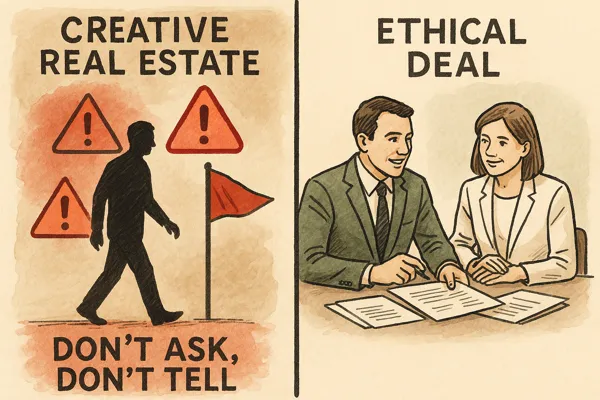
“Don’t Ask, Don’t Tell” Doesn't Work in Creative Finance
Understanding constructive knowledge, ethics, disclosure, and due diligence isn’t optional in creative finance—it’s your best defense.
In creative finance, there’s a common temptation to lean on advice from Facebook groups, YouTube influencers, or mentorship programs. One of the most dangerous recurring themes is the idea of “don’t ask, don’t tell”—especially when it comes to things like due-on-sale clauses, seller distress, or unresolved title issues. While this may feel like a strategy to reduce accountability, the law calls this constructive knowledge, and it can turn silence into liability.
What Is Constructive Knowledge?
Constructive knowledge is what the law says you should have known—even if you claim you didn’t. If a fact was reasonably discoverable through proper due diligence, you can be held responsible for it. This principle plays a major role in fraud cases, breach of ethical duty, contract cancellation, and enforcement of regulatory protections like those in foreclosure statutes.
In real estate, especially when working with distressed sellers, wrap mortgages, or unconventional structures like Subject-To or Contract for Deed, courts often look at whether the investor exercised reasonable care. That includes what documents were available, what questions were asked—or deliberately avoided—and whether the investor had a duty to disclose, explain, or correct a misunderstanding.
A Realistic Example: “Don’t Ask, Don’t Tell” Blows Up
Let’s say an investor buys a property Subject-To the existing mortgage. The seller is behind on payments, but the investor is told everything’s “current” and doesn’t push further. The investor never asks for the actual mortgage statement, doesn’t confirm with the lender, and accepts a screenshot of an old balance as sufficient.
The seller later sues for fraud and misrepresentation, claiming the investor promised to bring the loan current but never did. The investor argues they “didn’t know” the arrears existed and the seller never disclosed it. But the court rules the investor had constructive knowledge because:
The seller’s stress and language hinted at default.
The investor had the ability to request a payoff or reinstatement figure but didn’t.
The investor accepted insufficient documentation without inquiry.
By choosing not to ask, the investor didn’t protect themselves—they actually exposed themselves. Courts don’t reward intentional ignorance.
Ethics and Responsibility in Creative Finance
Ethical investing requires more than contract templates and hustle. It means knowing when to slow down and ask real questions:
Is the seller facing financial distress or acting under pressure?
Have I explained the due-on-sale clause and credit implications clearly?
Are there other liens or unresolved debts?
Am I leaving anything unsaid to keep the deal from falling apart?
A good deal isn’t just one that closes—it’s one that holds up. Failing to vet details or hiding behind “that’s what the seller said” creates liability for fraud, rescission, or equitable unwinding.
Stay Above Board
At Creative TC, we specialize in structuring creative finance transactions that stand up to scrutiny. We know how easy it is to fall into ethical gray zones by following bad advice like “don’t ask, don’t tell.” That’s why our process is built around transparency, disclosure, and documented diligence.
We help you:
Get clear on what must be disclosed.
Confirm underlying debt status with real documentation.
Structure deals that account for natural creative finance risks without playing hide-and-seek.
Avoid liability traps that could invalidate your deal or worse—end up in court.
📅 Book a Free Appointment Today
Before you draft your next Subject-To or wraparound deal using someone’s recycled PDF from a Facebook group, let’s make sure your deal is actually legal, enforceable, and ethical. Schedule a free consultation with Creative TC today. We’ll walk through your deal and make sure it gets done right.
Book Your Free Consultation Now!
A well-structured deal lets both your paperwork and your conscience rest easy.

